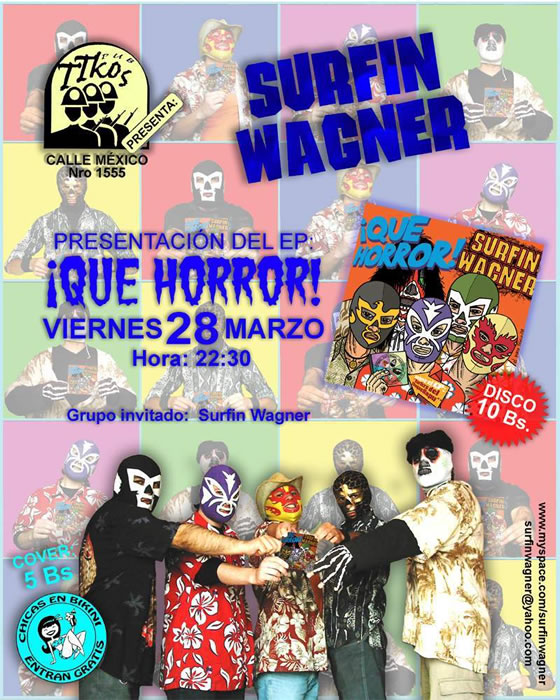|
My favorite example of the ironic appreciation of lucha libre, which I saw live on Friday night, is the band Surfin Wagner. I first heard of them because the lead singer was a friend of a friend, but quickly discovered they had quite a following of Paceños. The band’s name is derived from a famous Mexican luchador, Dr. Wagner, otherwise known as Manuel González Rivera. He began wrestling in the 1960s as a rudo, but by the early 1980s—when the members of Surfin Wagner and my friends were young children—he had become a technico. In 1985 he lost his match in a well-publicized event and essentially retired. The band, like my friends who I wrote about here, creates humor using a frame shifting strategy by combining lucha libre aesthetics with surf music. The band members use lucha libre inspired names (Pedro Wagner, Médiko Loko—a misspelling of famous Mexican luchador Médico Loco, Roy Fucker—after a Japanese anime character later used in Mexican wrestling, El Momia, and Comando—both popular characters in Bolivian wrestling), and wear lucha libre head-masks along with their Hawai'ian print shirts. They describe their music as “el Garage, el punk y principalmente el Surf, siempre con un toque de sátira e ironía” [garage rock, punk, and principally surf, always with a touch of satire and irony]. The “biography” of the band on their website suggests that the band members are legitimate luchadores (again with irony), and they point out the incongruity of a surf band in a country without access to the sea. Clearly their use of the lucha libre aesthetic is meant to evoke laughter rather than contribute to a serious musical appreciation. So, over these last three posts, I've tried to give a sense that for many Paceños lucha libre in general, and the cholitas luchadoras’ participation specifically, are a light-hearted representation of Latin American culture. In a sense, lucha libre is positioned as authentically Latin American in a now-globalized world. As they combine cholas with punk culture or classic Mexican luchadores with surf rock, they reterritorialize these “traditional” icons by merging them with global symbols.
0 Comments
Your comment will be posted after it is approved.
Leave a Reply. |
themes
All
archives
August 2022
|

 RSS Feed
RSS Feed
